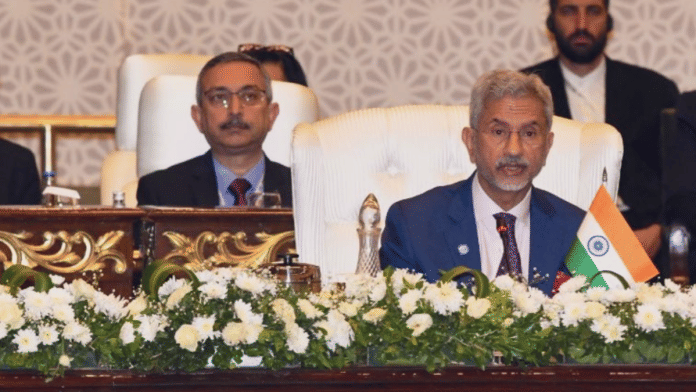New Delhi: Indian external affairs minister S. Jaishankar Wednesday took aim at China and Pakistan, calling for cooperation based on “mutual respect and sovereign equality”, during his remarks at the Shanghai Cooperation Organisation (SCO) Heads of Government summit in Islamabad.
“Cooperation must be based on mutual respect and sovereign equality. It should recognise territorial integrity and sovereignty. It must be built on genuine partnerships, not unilateral agendas. It cannot progress if we cherry-pick global practices, especially of trade and transit,” Jaishankar said.
He added: “If trust is lacking or cooperation inadequate, if friendship has fallen short and good neighbourliness is missing somewhere, there are surely reasons to introspect and causes to address.”
Jaishankar’s reference to territorial integrity and economic transit was a thinly-veiled taunt at both the border standoff between Beijing and New Delhi, as well as China’s Belt and Road Initiative (BRI)—the $1 trillion infrastructure project of President Xi Jinping—which envisions a series of airports, ports and roads connecting the country with the larger region.
Since June 2020, India-China ties have hit a rough patch after the military clashes in Galwan. While Jaishankar in recent months has mentioned that “75 percent” of the negotiations on disengagement had been completed, there still remains the larger question of de-escalation at the border.
However, for New Delhi, the challenge on the border is one of territorial integrity, especially as it believes Beijing attempted to unilaterally change the status quo on the Line of Actual Control (LAC), breaking nearly two decades of agreements on the border issue.
India has stopped direct flights to China, while reducing the number of visas given to Chinese citizens. It has also targeted a host of technology applications built by Chinese companies—banning several, including TikTok—for security reasons.
Li Qiang, the Chinese Premier, is leading the country’s delegation to the SCO meet in Pakistan. Jaishankar’s visit to Pakistan, is the first by an Indian foreign minister in nine years after late Sushma Swaraj, who was in the country for the Heart of Asia summit on Afghanistan in December 2015.
The SCO is a Eurasian regional organisation founded by the Shanghai Five—China, Kazakhstan, Kyrgyzstan, Russia and Tajikistan along with Uzbekistan in 2001. India and Pakistan both joined the organisation in 2017, while Iran joined in 2023 and Belarus, the newest member, in July 2024.
Also read: Modi takes aim at China at East Asia Summit, calls for ‘development’, not ‘expansionism’
Combatting terrorism, extremism & separatism to improve trade
Pakistani Prime Minister Shehbaz Sharif was listening as Jaishankar said the issue of cross-border terrorism was “unlikely” to encourage trade ties between members of the SCO, hinting at Islamabad’s role in supporting such activities in India, without naming the country.
The Indian minister reiterated New Delhi’s support for the organisation’s aims in battling the three evils of “terrorism, separatism, and extremism”.
“And as the Charter spelt out, this means being firm and uncompromising in countering the ‘three evils’. If activities across borders are characterised by terrorism, extremism and separatism, they are hardly likely to encourage trade, energy flows, connectivity and people-to-people exchanges in parallel,” he said.
In 2019, after the abrogation of Article 370, Islamabad downgraded diplomatic ties with India and banned trade with New Delhi. Since the 1970s, the period between 2019 and 2024 has been the longest without ambassadorial level diplomatic ties between the two South Asian neighbours.
Jaishankar also brought to the notice of SCO members the question of United Nations Security Council (UNSC) reforms. Both China and Pakistan have not been supportive of India’s quest to become a permanent member of the UNSC.
“While we each make our contribution, the world order is more than the sum of its parts. As it changes, global institutions do need to keep pace. That is why the case for ‘reformed multilateralism’ gets stronger by the day. Comprehensive reform of the UN Security Council, both in the permanent and non-permanent categories, is essential,” said the Indian foreign minister.
He added: “I remind you that we (SCO) recognised in July 2024 at Astana that the credibility and effectiveness of the UN is dependent on ensuring the representation of developing countries through comprehensive reform. Similarly, in the ‘Pact for the Future’ which was adopted at the recent UN General Assembly, our leaders have agreed to reform the Security Council, to make it more representative, inclusive, transparent, efficient, effective, democratic and accountable.”
Jaishankar, who landed in Islamabad Tuesday, attended dinner with other leaders, which was hosted by the Pakistani prime minister. He also held a meeting with the Mongolian Prime Minister L. Oyun-Erdene Tuesday. Mongolia is an observer country at the SCO.
(Edited by Tikli Basu)
Also read: Ports, grants, defence to detained fishermen, key takeaways from Jaishankar’s visit to Sri Lanka






